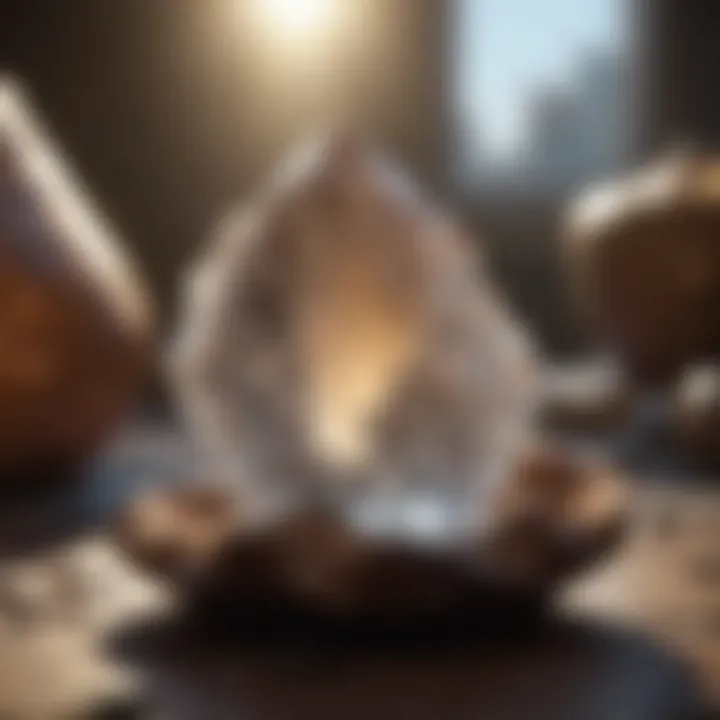Understanding Stones by Name in Astrology: Their Significance


Intro
Understanding the relationship between stones and astrology provides unique insights into both disciplines. Stones possess energetic qualities that can correspond with the traits of various zodiac signs. This section lays the groundwork for a detailed exploration of astrological concepts, the intricacies of zodiac signs, and celestial events that influence these connections.
Astrological Concepts
Definition of Key Terms
Before delving deeper, it is important to clarify some key terms. Astrology is the study of celestial bodies' movements and positions, believed to influence human affairs and natural phenomena. Zodiac signs are twelve divisions of the celestial sphere, corresponding to specific time periods in the year, each associated with unique traits and characteristics. Finally, stones often referred to as gemstones or crystals, are believed to hold various properties that can amplify or diminish energies.
Historical Background of Astrology
Astrology has ancient roots, tracing back thousands of years to Babylonian civilization. Over the centuries, it evolved through contributions from various cultures, including the Greeks and Romans. Each culture brought its own insights and interpretations, which led to diverse practices within astrology today.
Overview of Different Astrology Branches
There are multiple branches within astrology, each focusing on different aspects:
- Natal Astrology examines individual birth charts to provide personalized insights.
- Mundane Astrology concerns itself with world events and global trends.
- Electional Astrology assists in choosing the best moments for important activities.
- Horary Astrology answers specific questions based on the moment a question is asked.
Understanding these branches is crucial as they can be relevant when exploring the relationship between stones and zodiac signs. Each branch comes with its own methods and tools, making astrology a rich and complex field.
Zodiac Signs Exploration
In-Depth Analysis of Each Sign
The zodiac comprises twelve distinct signs, from Aries to Pisces. Each sign is associated with specific elemental properties, ruling planets, and unique character traits. For instance, Aries, a fire sign, embodies ambition and energy, while Taurus, an earth sign, focuses on stability and material comfort. Each sign interacts with various stones, enhancing their natural qualities.
Personality Traits and Characteristics
Exploring the personality traits of each zodiac sign reveals how stones can influence them:
- Aries: Bold, courageous. Stones like garnet amplify their assertiveness.
- Taurus: Practical, sensual. Emerald enhances their love for beauty.
- Gemini: Curious, adaptable. Agate provides balance and grounding.
Historical and Mythological Connections
Each sign has rich historical roots linked to mythological stories. For example, the tale of Aries relates to the Golden Fleece, symbolizing leadership and bravery. By understanding these connections, one can appreciate how different stones resonate with the sign’s essence.
Celestial Events
Major Cosmic Phenomena
Celestial events, such as solar eclipses or planetary retrogrades, create significant energetic shifts affecting all zodiac signs. These moments can be powerful times for reflection and intention-setting, particularly when working with specific stones.
Impact of Celestial Events on Astrology
The alignment of planets can enhance or diminish the properties of specific stones. For example, during a Mercury retrograde, communication stones like lapis lazuli are believed to be particularly beneficial.
Rituals and Practices During Celestial Events
Many practitioners engage in rituals that incorporate stones during these cosmic occurrences. Common practices include meditations, crystal work, or creating altars dedicated to specific energies or intentions. Using the right stones can amplify the effectiveness of these practices, creating a deeper connection to celestial energies.
Preface to Stones in Astrology
The Role of Stones in Astrological Practices
Stones play a crucial role in astrological practices. They are often used as tools for meditation, healing, and personal empowerment. Each stone vibrates at its own frequency, influencing the energies around it. For instance, various gemstones serve as amplifiers of intentions during rituals or spiritual practices. Their unique properties can align with particular astrological symbols, strengthening the user's connection to their astrological chart.


Moreover, wearing these stones as jewelry can serve as a daily reminder of one’s intentions, goals, or astrological insights. When a practitioner understands how a stone interacts with their zodiac sign, the stone's power can be further enhanced. Thus, the engagement with stones in astrology becomes a two-way street, fostering growth.
Historical Context of Stones in Astrology
The historical context of stones in astrology reveals deep-rooted traditions across cultures. Ancient civilizations, such as the Egyptians and the Greeks, recognized the power of stones and their astrological significances. For example, the Egyptians associated specific gemstones with their deities, believing these stones could connect the human spirit with divine energies. Furthermore, the Greeks implemented stones in their understanding of astrology, associating them with planetary influences and zodiac signs.
As centuries rolled on, even the practice of alchemical traditions began to incorporate stones as symbols of transformation. In the realm of modern astrology, stones like amethyst or citrine continue to find relevance, bridging the past with present-day practices. Understanding this historical context enriches our comprehension of stone meanings and their applications in contemporary astrological practices. This continuity highlights the timeless relationship between stones and astrology, inviting individuals to explore and utilize this ancient wisdom in their lives.
Categories of Stones
Understanding the Categories of Stones is pivotal to recognizing their role in astrology. Each stone possesses unique properties and energies that correspond to various astrological meanings. Classifying stones helps in identifying their strengths and potential applications in astrological practices. For astrologers, tarologists, and esotericists, knowing these categories is not just beneficial; it is essential for creating deeper connections between stones and individual zodiac signs. This section explores the three primary categories of stones relevant to astrology: precious stones, semi-precious stones, and organic stones.
Precious Stones
Precious stones, often regarded as the most valuable within the repertoire of astrological tools, include well-known gems such as diamonds, rubies, sapphires, and emeralds. These stones are characterized by their rarity, durability, and captivating beauty. They are believed to carry significant metaphysical properties that can enhance personal attributes and astrological influences.
For example, diamonds are often associated with strength and purity, offering power to those born under Aries. The deep blue of sapphires resonates with wisdom and protection, ideal for Virgos seeking clarity and order in their lives. The benefits of precious stones extend beyond aesthetics; they serve as potent channels for energy that can potentially enhance one's personal growth and transformation.
- Symbolic Meanings: Each precious stone has symbolic meanings aligned with specific zodiac signs.
- Energetic Properties: They carry vibrations that can resonate with the wearer's astrological profile.
Semi-Precious Stones
Semi-precious stones, while not as rare as their precious counterparts, offer a wealth of mystical and healing qualities. Stones such as amethyst, rose quartz, citrine, and topaz fall within this category. Each carries a set of specific energies that can assist in astrological practices.
For instance, amethyst is celebrated for its calming energy and is thought to bring clarity to Aquarians, while rose quartz promotes love and companionship, aligning well with Libras. The accessibility of semi-precious stones makes them a popular choice for those looking to enhance their astrological connection without a significant financial outlay.
- Versatility: Semi-precious stones can be used in various practices, from wearing as jewelry to incorporating them into meditation.
- Affordability: They provide astrological benefits without the high cost associated with precious stones.
Organic Stones
Organic stones, including pearls, amber, and coral, are derived from living organisms rather than being mined from the earth. These stones are valued for their unique origins and the energies they invoke. In astrology, organic stones are believed to bridge the gap between the mineral world and the natural elements.
Amber, for instance, is revered for its healing properties and its connection to the Cancer sign, promoting emotional stability and grounding. Pearls, often linked to purity and wisdom, resonate profoundly with Pisces, facilitating deeper intuitive connections.
- Natural Origins: Their origins reflect a different type of energy that can be beneficial in astrological practices.
- Healing Properties: These stones often carry specific emotional and physical healing benefits tied to their natural states.
By categorizing stones into these three groups, we gain a structured approach to understanding their influences and benefits in relation to astrological practice, empowering individuals to make informed choices.
Astrological Correspondences of Stones
Astrological correspondences of stones play a crucial role in linking personal attributes to the broader astrological influences. Each stone resonates with specific energies and characteristics, reflecting the traits associated with various zodiac signs. Understanding these correspondences can enhance a person's astrological practice and personal development. It illustrates how stones can be used purposefully, whether one seeks emotional healing, mental clarity, or spiritual growth.
Birthstones and Their Significance
Birthstones hold profound significance, traditionally associated with the month of a person's birth. Each stone is believed to offer unique benefits and align with individual traits. For example, individuals born in March may resonate with aquamarine, symbolizing tranquility and clarity. Through the years, various cultures have upheld the belief that wearing one's birthstone can enhance personal strength and bring good fortune. Therefore, these stones are more than mere adornments; they serve as talismans that connect one to celestial influences and heritage.
Zodiac Signs and Associated Stones
Each zodiac sign has specific stones that correspond to its inherent characteristics. These stones amplify the positive traits of the signs and help mitigate their weaknesses. Here’s a closer look at the associations:
Aries: Bloodstone
Bloodstone is known for its invigorating qualities. It helps Aries tap into their natural leadership abilities and courage. The stone’s key characteristic is its grounding energy, which balances the fiery temperament of Aries. It is seen as a beneficial choice for enhancing vitality and assertiveness. Furthermore, the unique feature of Bloodstone is its reputed ability to clear the mind, making it easier for Aries individuals to focus and achieve their goals. However, it may not be suitable for those prone to aggression, as its energizing properties could amplify restlessness.
Taurus: Emerald
Emerald has long been regarded as a stone of harmony and growth. For Taurus, it enhances a sense of stability and security. Its lush green hue embodies the earthiness that Taurus individuals often crave. This stone is popular due to its associations with love and fertility, making it a preferred choice for those seeking to nurture relationships. The unique feature of Emerald is its capability to promote patience, which is essential for the determined Taurus. Yet, its value may pose a risk if one seeks to acquire it merely for status.
Gemini: Agate


Agate is a stone that promotes balance and harmony. For Gemini, known for their dual nature, Agate helps reconcile conflicting thoughts and emotions. Its key characteristic is its ability to enhance communication, which is very important for Gemini individuals. This stone is a beneficial choice as it encourages self-acceptance and understanding. Its unique feature lies in its grounding effect, which can help stabilize the often scattered energies of Gemini. However, excessive dependence on Agate might hinder the spontaneous nature that Geminis appreciate.
Cancer: Moonstone
Moonstone resonates strongly with Cancer's sensitivity and intuition. This stone’s calming energy aids those born under this sign in navigating emotional depths. The key characteristic of Moonstone is its connection to lunar energies, enhancing intuition. It is a popular choice, particularly for Cancers seeking emotional balance. The stone's unique feature is its ability to reflect one’s inner feelings, helping to process emotions. The only potential disadvantage is that individuals may become too reflective, losing touch with the present moment.
Leo: Ruby
Ruby is a vibrant symbol of passion and vitality. For Leos, it amplifies confidence and leadership qualities. The key characteristic of Ruby is its boldness and its ability to inspire ambition. It is a favorable choice for those wanting to enhance their creative energies and social presence. The unique feature of Ruby is its reputed ability to bring joy and enthusiasm. However, it may heighten pride, which can be a double-edged sword for some Leos.
Virgo: Sapphire
Sapphire is known for its wisdom and clarity. It aligns perfectly with Virgo’s analytical nature, promoting logical thinking. The key characteristic of Sapphire is its calming effect, helping to focus energy on practical matters. This stone is a beneficial choice for Virgos aiming to enhance their communication skills in work and life. The unique feature of Sapphire is its association with truth, encouraging Virgos to express themselves honestly. A potential downside could be its tendency to encourage over-analysis.
Libra: Opal
Opal is a multi-faceted stone that reflects Libra’s love for beauty and harmony. It enhances creativity and emotional expression. The key characteristic of Opal is its ability to stimulate inspiration. It is a beneficial choice for Libras wanting to foster balance in relationships. The unique feature of Opal is its play of colors, mirroring Libra’s multifaceted personality. However, it can be overly stimulating for some, leading to indecision or distraction.
Scorpio: Topaz
Topaz is a stone of strength and clarity. For Scorpio individuals, it supports personal transformation and empowerment. The key characteristic of Topaz is its capacity to enhance intuition and courage. It is a valuable choice for those navigating emotional intensity. The unique feature of Topaz is its reputed ability to bring clarity to thoughts and feelings. Yet, excessive reliance on its energies could lead to obstinacy.
Sagittarius: Turquoise
Turquoise is known for its healing properties and protector attributes. It aligns well with Sagittarius’s adventurous spirit, promoting exploration and open-mindedness. The key characteristic of Turquoise is its ability to foster communication. It is a beneficial choice for Sagittarians wishing to express their thoughts freely. The unique feature of Turquoise is its connection to ancient wisdom, serving as a reminder of one’s heritage. However, constant exposure to this stone could lead to impulsiveness.
Capricorn: Garnet
Garnet is a stone that signifies confidence and commitment. For Capricorns, it reinforces ambition and determination. The key characteristic of Garnet is its grounding nature, perfect for focused leadership. This stone is a beneficial choice for those who seek success in professional endeavors. The unique feature of Garnet is its deeper connection to self-empowerment. Yet, it might also invoke a sense of burden in those who set overly high standards.
Aquarius: Amethyst
Amethyst is a stone of spirituality and balance, aligning well with Aquarius’s innovative nature. Its key characteristic is its calming energy, which promotes inner peace. It is a popular and beneficial choice for Aquarians wanting to cultivate self-awareness. The unique aspect of Amethyst is its ability to enhance intuition and creativity. However, it may lead to overthinking if not used mindfully.
Pisces: Aquamarine
Aquamarine is a soothing stone that resonates with Pisces’s emotional depth. It enhances tranquility and clarity of thought. The key characteristic of Aquamarine is its ability to calm the mind. This stone is a beneficial choice for Pisceans aiming to explore their creative side. The unique feature of Aquamarine is its connection to the sea, symbolizing emotional healing. A disadvantage could be its tendency to amplify sensitivities.
Practical Applications of Stones in Astrological Practices
The practical uses of stones within astrological practices are essential for enhancing personal growth and fostering deeper connections with one's astrological influences. By understanding how to implement these stones in various aspects of daily life, individuals can work towards aligning their energies with the cosmic forces presented by their zodiac signs. This section will cover three key areas: meditation and healing, wearing stones as jewelry, and using stones in rituals. Each of these applications plays a vital role in maximizing the benefits stones provide.
Meditation and Healing
Meditation with stones offers a profound method for grounding oneself and enhancing focus. Certain stones are believed to radiate specific energies that can support emotional and physical healing. For instance, amethyst is known for its calming properties and is often used during meditation to promote relaxation. When placed on the body or held in one’s hand, stones can help channel energy and facilitate a deeper meditative state.
To utilize meditation with stones effectively, consider the following steps:
- Choose the right stone: Different stones serve various purposes. Select one that resonates with your needs for meditation, whether it be for clarity, healing, or balance.
- Establish a quiet space: Settle in a comfortable, peaceful environment. This can enhance the overall experience and deepen the connection with the stone.
- Focus on the stone during meditation: Hold the stone or place it nearby. Allow its energy to become a focal point. This can anchor your thoughts and reduce distractions.
These practices, integrated over time, can yield significant insights and healing benefits in one’s life.
Wearing Stones as Jewelry
Wearing stones as jewelry serves both aesthetic and functional purposes. The practice can act as a constant reminder of one's intentions, while also providing energetic support throughout the day. People often wear specific stones that correspond to their zodiac sign or current life challenges they face. For example, Taurus individuals might wear emerald to connect with their nurturing qualities and promote emotional balance.
When selecting stones for jewelry, consider the following:
- Personal connection: Choose stones that feel good to you. A personal connection can enhance the benefits.
- Style and purpose: Whether it's a ring, necklace, bracelet, or earrings, the design should reflect your personal style while still serving its purpose in enhancing astrological energy.
- Quality of the stone: Seek authentic and ethically sourced stones. Quality is crucial for maximizing their energetic properties.


Wearing stones can serve as an ongoing connection to Earth’s energies and provide a practical means of incorporation into daily life.
Using Stones in Rituals
Stones hold significant power in various rituals, often symbolizing intention and facilitating spiritual energy during ceremonies. Using stones in rituals typically enhances the focus of the practice, whether for protection, attraction, or healing. Specific stones may be incorporated into different rites based on their associations with zodiac signs or particular astrological events.
Consider these factors when using stones in rituals:
- Ritual purpose: Define the aim of the ritual clearly. Understand which energies or qualities you wish to attract or repel.
- Stone selection: Choose stones aligned with your ritual goals. For example, if seeking protection, black tourmaline can be a suitable choice.
- Creation of a sacred space: Organize your ritual area thoughtfully. Arrange stones, candles, and any other relevant items to promote positive energy flow.
By integrating stones into rituals thoughtfully, individuals can enhance their spiritual practices and harness the power of astrological influences effectively.
Stones in Cultural Context
The cultural significance of stones in astrology extends beyond their physical presence. Various cultures have ascribed different meanings and properties to stones, intertwining them with beliefs and traditions that shape their spiritual and practical uses. Understanding these cultural perspectives enriches our appreciation of astrological practices involving stones.
Cultural Beliefs Around Stones
Different civilizations have historically held unique beliefs regarding the power and meaning of stones. In ancient China, jade was a revered stone symbolizing purity, protection, and immortality. The Chinese believed that wearing jade could enhance one's personal virtues. In India, gemstones often feature prominently in astrology, with specific stones assigned to various planetary influences.
- Amethyst: Widely regarded for its calming properties, amethyst promotes clarity and balance. Hindus often correlate it with serenity and peace.
- Emerald: Seen as a stone of wisdom and growth, emerald is associated with the planet Mercury. It is thought to enhance intelligence and communication.
- Ruby: In many cultures, rubies symbolize strength, passion, and love, thus linking them to courage and emotional stability.
The archaeological records display instances where stones were used in rituals, such as the burial of the dead with precious stones to ensure protection in the afterlife. These traditions acknowledge the stones' believed capacities in harmonizing the spiritual and physical realms.
Stones in Mythology and Folklore
In various mythologies, stones have been more than mere physical entities; they have served as vessels for stories, deities, and spiritual truths. For example, ancient Greeks considered certain stones to be gifts from gods, holding immense power. Hercules, famed for his strength, was often depicted possessing a shield adorned with precious stones. Each stone represented different virtues and protective qualities, a reflection of the ancients' understanding of the material world governing spiritual aspects.
Furthermore, folklore has also spurred legends around specific stones. Many Native American tribes view stones as sacred elements of the Earth, holding memories and spiritual messages. For example, the turquoise is often seen as a healing stone, offering protection and support in times of distress.
“In essence, stones are not only geological artifacts but carriers of stories, beliefs, and history.”
The vast array of cultural beliefs surrounding stones illustrates their multidimensional nature in astrological contexts. Recognizing these cultural nuances aids astrologers, tarologists, and esotericists in employing stones more effectively in their practices, aligning their uses with deeper meanings woven throughout history.
Scientific Perspectives on Stones
Understanding the scientific perspectives on stones offers valuable insights into their role in astrology. This section examines how the geological composition and properties of stones can influence their perceived qualities and uses in astrological practices. By grounding astrological interpretations in scientific context, readers can gain a more informed appreciation of the relationship between stones and astrological attributes.
Geology and Composition of Astrological Stones
The geology of astrological stones plays a crucial role in their significance. Each stone comes from a unique geological background, which imparts specific characteristics. For example, the formation of a sapphire, predominantly corundum, involves intense heat and pressure in metamorphic rocks. This process not only contributes to its hardness but also to its energy properties in astrology.
Many stones contain trace elements that affect their color and energy. For instance, the lush green of an emerald arises from chromium and vanadium. In astrological terms, these elements are believed to affect not just the stone’s appearance, but also its metaphysical properties. Understanding these geological aspects allows astrologers to align their interpretations with the stones' inherent qualities.
Potential Benefits and Criticisms
While many practitioners advocate for the use of stones in astrology, there are both benefits and criticisms to consider. Supporters often highlight several advantages of using stones:
- Energy Amplification: Many believe that stones can amplify energies related to specific zodiac signs. For example, opals are thought to enhance creativity, while garnets promote passion.
- Physical and Emotional Healing: Certain stones are associated with healing properties. Amethyst is seen as beneficial for stress relief, while obsidian can aid in grounding.
- Personal Growth: Stones can serve as catalysts for self-improvement. By carrying or wearing specific stones, individuals often feel more balanced or empowered in their personal journeys.
However, criticisms exist. Some argue that the claims surrounding stones lack empirical support. The effectiveness of stones can vary significantly from person to person. Others feel that reliance on stones may shift focus away from personal responsibility in achieving life goals. It's valuable for individuals to engage with stones mindfully, recognizing that while they can enhance the astrological experience, they are not a substitute for personal effort or reflection.
In summary, the intersection of geology and personal growth offers a rich avenue for exploration. Understanding the underlying science behind stones can enhance their use in astrological practices while also encouraging critical thought in their applications.
The End
The conclusion of this article serves as a pivotal point for understanding the intricate role stones play in astrology. Each of these stones, whether precious or organic, is more than just a mineral; they carry energetic implications that resonate significantly with astrological principles. By exploring their associations with different zodiac signs, we enhance our comprehension of personal growth and self-discovery.
A thorough examination of stones reveals how their unique characteristics can influence an individual’s life path and emotional landscape. The benefits of integrating these stones into one’s astrological practices are manifold. Enhanced meditation, effective rituals, and well-chosen jewelry can create a harmonious environment that fosters personal insight and spiritual clarity. Furthermore, understanding stones in a cultural context enriches the narrative of astrology itself, offering layers of historical depth and mythological significance.
In summary, recognizing the significance of stones in astrology not only helps individuals connect with their astrological identities but also empowers them in their journey of self-exploration and transformation. By utilizing the knowledge presented throughout this article, readers can make informed decisions that align with their astrological signs and personal growth goals.
"Understanding the relationship between stones and astrology brings depth to one's journey in esoteric practices, illuminating pathways toward self-knowledge and empowerment."
As we conclude, it is clear that the informed use of stones in astrological practices represents not just a trend, but a profound engagement with the forces that shape our existence.







